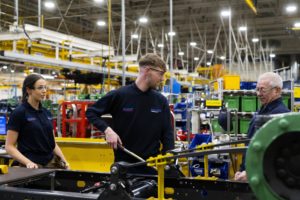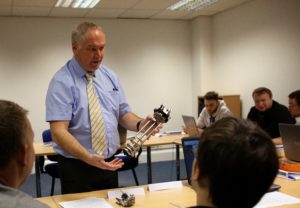
National Apprenticeship Week, which ran from 6-10 February this year with the theme Skills for Life, was a reminder that apprenticeships are a great route into the industry where people from all walks of life can become highly qualified through on-the-job learning.
Leyland Trucks is currently offering 24 apprenticeships this year and the recruitment process will see the company take on 12 assembly operator apprentices, six automotive engineer apprentices and two facilities and maintenance apprentices.
The company is also on the lookout for two design engineer apprentices, who will work on new innovations for both diesel and electric trucks.
Following the success of Leyland Trucks’s first ever supply chain apprentice in 2022, the company is also recruiting two new apprentices for this scheme in 2023.
The apprenticeships on offer at Leyland Trucks are open to all ages, and include degree level apprenticeships, which are open to applicants with relevant level 3 qualifications, including A levels or BTECs.
Many of the company’s current leadership team and senior management began their careers at Leyland Trucks on trainee schemes, and the business has a long track record of promoting from within.
Also, the successful cohort from 2022 will be peer mentors for the new recruits.
Maria Rogers, HR and training advisor for Leyland Trucks, said: “The company is expanding the scheme across many departments and our goal with the apprenticeship scheme is to develop a new generation of talent to enable us to continue leading the industry across product development, vehicle technology, manufacturing quality and supply chain management.
“The apprenticeships we’re offering this year provide a choice of roles across our office and factory environments, with a commitment to training and long-term prospects.”
Alexander Dennis has announced enhancements to its AD24 Training Academy courses for apprentices to incorporate new technologies and vehicles including battery electric and hydrogen fuel cell buses, alongside traditional diesel systems.
The AD24 apprentice training course upskills apprentices on the electric systems used on modern buses as well as teaching how to electronically troubleshoot using multi-meters and the latest diagnostic tools.
AD24 encourages in-person classroom training and this can take place at both Alexander Dennis’s facilities in Farnborough, or on-site at the location of the trainees.
All courses are fully approved by the Institute of the Motor Industry.
Tony Davis, Group Aftermarket Director at Alexander Dennis, said: “Whilst mechanical components still form the backbone running gear on a bus, even on diesel buses most mechanical components are now controlled using CAN lines, ECUs and multiplex systems.
“Our approach is to teach the skills create a good technician, rather than just a mechanic.”
Meanwhile, The Go-Ahead Group has set a target of hiring 700 apprentice bus drivers for Go-Ahead London, which runs a quarter of the capital’s buses for Transport for London.
A further 100 apprentices will work at Go-Ahead’s regional bus companies and in head office roles in London and Newcastle.

Also, 32% of new apprentices were aged over 40, including many career switchers seeking a new start in transport.
Go-Ahead London’s Camberwell academy uses virtual reality technology to teach driving skills, and trainees alternate over the course of a year between periods driving buses and time in the classroom.
Last year, 77% of those who started the course completed their apprenticeship and gained a qualification.
Since the training programme was introduced in 2018, the bus company has been able to offer numeracy and literacy training equivalent to Maths and English GCSEs, and additional support to those with a range of neurodiverse conditions.
Scott Maynard, Go-Ahead Group’s HR Director, said: “We want our workforce and the transport industry to reflect the communities we serve.
“Our apprenticeships programme is forever expanding, and the vast majority of our apprentices continue their careers with Go-Ahead after their training is completed”.
Nestlé’s new apprenticeship programme sees apprentices learn both sides of its transport hub – working in both the transport planning department and the delivery operations team.
For off-the-job training, apprentices learn their theory before going on to complete their practical C+E HGV Licence, allowing drivers to haul up to 44 tonnes.
Lucy Gray, from York, worked in the car industry for seven years and then in transportation for a bathroom company, before becoming Nestlé’s first ever HGV apprentice in the UK.
Sally Wright, Head of Delivery at Nestlé UK & Ireland, said: “Lucy, and the apprentices who follow in her footsteps as we roll this out, will spend time on the road with drivers, but also in our transport planning team, so that they understand how we plan our transport and, more importantly, why we plan it that way.”
Tom Collins and Tom Dixon, based at Palletline Logistics business S&S Distribution, joined the Palletline Logistics driver apprenticeship scheme that was launched when the UK was in the grips of a driver shortage.
The twelve-month programme allowed the apprentices to learn the skills needed to work within Palletline whilst training for their C+E licences.
They worked through various workshop-based modules to learn a range of skills and also went out with the S&S Distribution team to conduct deliveries in 3.5-tonne commercial vans.
Romas Kusneraitis, Director of S&S Distribution, said: “Driver apprenticeships do work and are an ideal route for people starting their career or looking for a change of direction.

Vehicle technology is rapidly accelerating, and driver vacancies will remain, so the sector will need to continue to train the next generation of vehicle technicians to ensure its future success.








